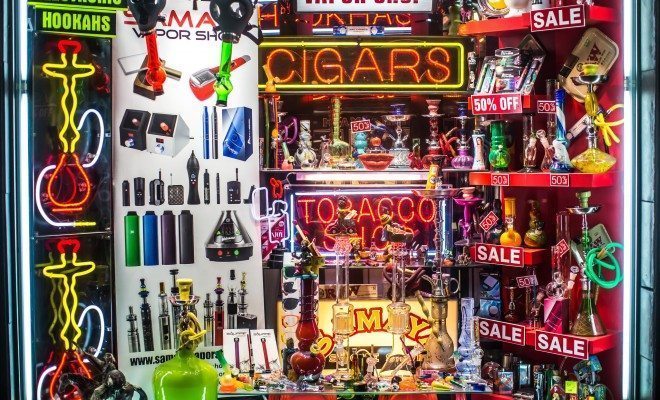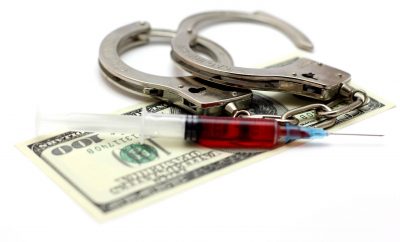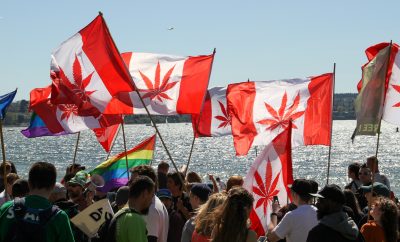 Image courtesy of [Thomas Hawk via Flickr]
Image courtesy of [Thomas Hawk via Flickr]
News
Legal Doesn’t Mean Safe: The Rise of Synthetic Drugs
A soda, a pack of gum, and some psychoactive drugs might all be available for checkout at typical gas stations across the globe. Head shops, gas stations, and online sites are legally selling drugs that the United Nations Office on Drugs and Crime call new psychoactive substances (NPS). Also known as “designer drugs,” “herbal highs,” or “legal high” drugs, NPS have come under increased international scrutiny as variations of these drugs continue to develop and as alarming research on the dangerous health effects of these substances emerges. In light of this, some places, such as Scotland, are beginning to shut down the sale of these substances.
Harminasion, a shop that sells legal high drugs in Aberdeen, Scotland, was forced to close its doors last Wednesday and will remain out of business for the next three months after Aberdeen police and city council members secured a closure order under the Antisocial Behaviour Act of 2004. The shop’s closing is believed to be a Scottish first in an effort to thwart the destructive consequences of NPS.
NPS are defined as “substances of abuse, either in a pure form or a preparation, that are not controlled by the 1961 Single Convention on Narcotic Drugs or the 1971 Convention on Psychotropic Substances, but which may pose a public health threat.” “New” does not necessarily mean that the drug is a new invention, but rather that the substances have recently become available. These drugs are synthetic, “legal” alternatives to internationally controlled drugs, intended to mimic the effects of illicit drugs. NPS emerge rapidly, making controls for these drugs extremely difficult. The increased use and emerging trade of NPS have created concerns that transnational organized criminal groups could exploit the market for these substances.
One class of new psychoactive substances is synthetic cannabinoids, such as “spice,” which was introduced to the United States around 2009, marketed as potpourri, and labeled “not for human consumption” to avoid FDA regulations. Spice or “K2” is an herbal material infused with dangerous chemicals that imitate the effects of THC, although it is much more potent and can be extremely harmful. Due to the ever-changing concentrations of chemicals used to make synthetic cannabinoids, data on human toxicity related to the use of these drugs remains limited. However, known health-related problems associated with their use include cardiovascular complications, psychological disorders, physiological dependence, hallucinations, paranoid behavior, agitation, anxiety, nausea, vomiting, and seizures. Data has also shown that an increasing number of suicides are also associated with use of synthetic cannabinoid products such as spice.
The Scottish decision to close the Aberdeen shop comes just weeks after the launch of an interactive online video that warns teens of the dangers and risks associated with legal high drugs. The video will be available to every secondary school throughout Scotland. Detective Inspector Michael Miller said of NPS use:
It’s become clear that officers are spending an increasing amount of time dealing with the diverse issues brought on by new psychoactive substances as the trend to take them escalates… It horrifies me that young people willingly take a substance without knowing what it contains or the effects it will have.
Scotland is not the only country in Europe feeling the daunting impact of NPS. The European Monitoring Centre for Drugs and Drug Addiction reported an unprecedented increase in the number, type, and availability of new psychoactive substances in Europe over the past five years. The report claims that 101 new psychoactive substances were reported for the first time in 2014. What is truly shocking is the alarming number of seizures–46,730–of new psychoactive substances in 2013 alone. To combat the rapid increase of the drugs, several countries have amended their legislation to control the manufacture, trafficking, possession, sale and use of NPS. However, including a drug on a prohibited or scheduled list is often a lengthy process that requires health risk assessments based on scientific data, (data that is scarce for NPS) and can take several months to approve. For this reason, many governments have resorted to “emergency scheduling” to introduce temporary bans on NPS until the legislative process can be completed. Australia, China, Croatia, Bahrain, Ghana, Hungary, Ireland, Italy, Netherlands, Russian Federation, Saudi Arabia, the United Kingdom and the United States reported in a UNODC questionnaire on NPS to having used emergency scheduling to temporarily ban NPS. New psychoactive drug information has also begun to appear on national drug surveys due to the growing need to monitor and combat their use.
In the United States, NPS use is on the rise, mimicking the international trend. In 2011, the annual “Monitoring the Future” national survey asked 12th graders about their drug use; the survey found that synthetic cannabinoids ranked second in annual prevalence only to natural cannabis. Notably, the states with the highest number of calls to U.S. Poison Centers involving synthetic cannabinoids in 2015 are states with harsher cannabis laws. Washington, Oregon, Colorado, and Alaska are the only four U.S. states with legalized recreational cannabis, although they are in different stages of implementation. Those four states combined have had a total of 41 calls to poison centers this year, while Mississippi, a medical marijuana state with decriminalization laws, alone has had over 1,000 calls. In April, New York officials issued a health alert after more than 160 patients over a span of just nine days were admitted to hospitals across the state for adverse reactions to spice. In Mississippi, 97 cases of synthetic marijuana abuse were reported to the Mississippi Poison Control Center over an eight-day span in April. Although the Synthetic Drug Abuse Prevention Act of 2012 banned the synthetic compounds found in NPS, there is obviously still an NPS abuse problem in the states, and we will probably see crackdowns similar to Europe on the rise.
In one German study on NPS, more than three out of five respondents indicated the legal availability of NPS as a major motivation for use. This result speaks to the importance of monitoring and scheduling new variations of NPS, shutting down head shops, gas stations, and websites that sell the drugs, and educating young people that the legality of the drugs does not imply their safety. Closing stores that sell these drugs will attack the infrastructure of NPS propagation and will deter novice NPS users from experimenting with these unsafe substances. Openly condemning the NPS market will also combat the current normalization of NPS use, which the open, “legal” sale of these drugs promotes. While policy reform is important, education is the most powerful tool for change. The U.S., and other locations, should take after Scotland in its efforts to inform young people about the detrimental impacts of new psychoactive substances.








Comments